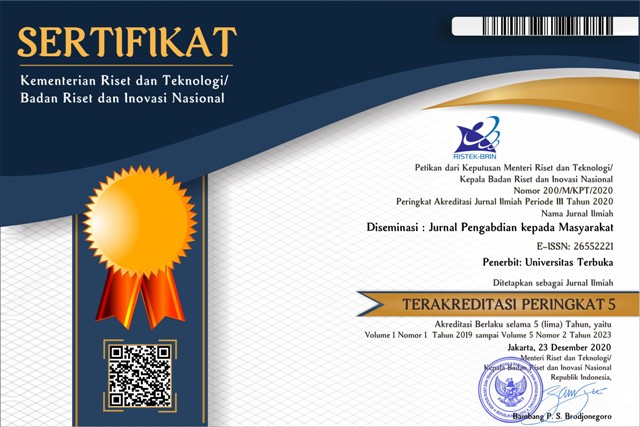IMPLEMENTASI NILAI-NILAI ANTIKORUPSI PADA SISWA SEKOLAH MENENGAH DI KOTA SURAKARTA
DOI:
https://doi.org/10.33830/diseminasiabdimas.v4i2.3307Keywords:
nilai kejujuran, perilaku korupsi, nilai anti korupsiAbstract
Anti-Corruption Schools (SAK) are an effort to foster an anti-corruption attitude in the context of realizing a country that has high integrity. The SAK program has been successfully implemented in the student environment as an effort to tackle corruption through students as agents of chance. This service aims to provide provisions and insights regarding anti-corruption attitudes. The objects of concern are junior high school (SMP) and senior high school (SMA) students. SAK service is carried out scientifically and descriptively by placing school members from teachers to students as the goal of the sustainability of the benefits that will be received. SAK provides counseling to teachers and students in order to improve attitudes with integrity. From the teacher's point of view, teachers are expected to continue to monitor the development of their students' attitudes at school so that an attitude that prioritizes integrity can continue to be embedded and grow in the daily attitudes of their students, so that a corruption-free Indonesia can be realized in the future.
Sekolah Anti Korupsi (SAK) merupakan salah satu bentuk upaya menumbuhkan sikap anti korupsi dalam rangka mewujudkan Negara yang memiliki integritas tinggi. Program SAK telah sukses dijalankan dalam lingkungan mahasiswa sebagai upaya penanggulangan korupsi melalui mahasiswa sebagai agent of chance. Pengabdian ini bertujuan untuk memberikan bekal dan wawasan mengenai sikap anti korupsi. Objek yang menjadi perhatian adalah siswa Sekolah Menengah Pertama (SMP) dan Sekolah Menengah Atas (SMA). Pengabdian SAK dilakukan secara ilmiah dan deskriptif dengan menempatkan warga sekolah mulai dari guru hingga siswa sebagai tujuan dari keberlangsungan manfaat yang akan diterima. SAK memberikan penyuluhan kepada guru dan siswa dalam rangka meningkatkan sikap yang berintegritas. Dari sudut pandang guru, guru diharapkan untuk terus memantau perkembangan sikap siswanya di sekolah sehingga sikap yang mengedepankan integritas dapat terus tertanam dan tumbuh dalam sikap sehari-hari para siswanya, agar terwujud negara Indonesia yang bebas korupsi di masa depan.
References
Bird, K. S., Tripney, J., & Newman, M. (2013). The educational impacts of young people’s participation in organised sport: A systematic review. Journal of Children’s Services, 8(4), 264–275.
Hernandez, M. A., Sengupta, A., & Wiggins, S. N. (2012). Examining the effect of low-cost carriers on nonlinear pricing strategies of legacy airlines. Advances in Airline Economics, 3, 11–53. Emerald Group Publishing Ltd.
Sumaryati, Murtiningsih, S., Murtiningsih, S., Septiana, & Maharani, D. P. (2020). Penguatan pendidikan antikorupsi perspektif esensialisme. Integritas: Jurnal Antikorupsi, 6(1), 1–14. Retrieved from https://jurnal.kpk.go.id/index.php/integritas/article/view/408
Transparency International Indonesia. (2020). Korupsi dan integritas politik. Retrieved from http://www.unodc.org
Downloads
Published
Issue
Section
License
Copyright and Licensing

Diseminasi : Jurnal Pengabdian kepada Masyarakat is licensed under a Creative Commons Attribution-NonCommercial-NoDerivativeWorks 4.0 International License. Allows users to copy and distribute the Article, provided this is not done for commercial purposes and further does not permit distribution of the Article if it is changed or edited in any way, and provided the user gives appropriate credit (with a link to the formal publication through the relevant DOI), provides a link to the license, and that the licensor is not represented as endorsing the use made of the work.















